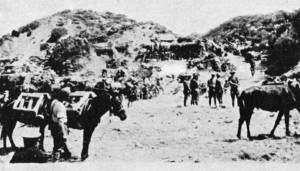Garibaldi (‘Garliano’) Bitossi – Andrew (tenor)
The following article was published in the RSA Review, the publication of New Zealand’s Returned Services’ Association (RSA) monthly newspaper, issued in October 1979. It is a personal and researched story by the author, who states “the material on which the story is based was contained in a brief, almost monosyllabic account in a 1915 newspaper. The newspaper account came from a letter written home by Garliano Bitossi to his parents.”
For more information on the RSA visit http://www.rsa.org.nz
A FAMILY MEMBER’S ACCOUNT OF WW1
“NOT FIT TO BE CALLED A VETERAN”
A few years ago I spent an illuminating hour nattering with an old chap who had “sat out” the traditional parades and gatherings of the day. While we chatted he mentioned that he had spent seven months on Gallipoli before being permanently invalided home with a sudden eye failure. I was quite taken aback when he went on to say that he has never worn his medals or taken part in any Anzac Day ceremonies because – to use his own words – “he hadn’t been a front-liner”.
It took another half-hour of general conversation to learn that his time on Gallipoli had been spent on leading mules up and down from the beaches to the tops with supplies, and that he seemed tragically resigned to a belief that only people who had manned the front line trenches were really fit to call themselves veterans.
By the time an hour had passed, the old chap was starting to recall and reminisce on snatches of incidents from his distant past – of being under shellfire on the beach, of having to run the gauntlet of direct fire across exposed gaps in the roads up to the tops, and of having had a mule tether line shot through by machinegun bullets only inches from his hand. Yet his parting words were; “They wrote books all about the infantry and the gunners, but did anyone ever get excited over the exploits of the mule punchers?”
I can only hope he hadn’t felt like that during all the years that had passed by. I thought of him some time later when I came across the story of a man named Bitossi, a private in the NZ Army Service Corps. From the research I’ve done I believe the man I chatted to years before was Bitossi himself.
There were, on Gallipoli, few places more aptly named than Dead Man’s Gully. It was known by a variety of other names, depending on which unit one came from – names like Valley of Death, or Suicide Gully – but whatever one chose to call it, that ugly twisted scar that ran up through the crags from Anzac Beach was the end of the road for many a good man. There was ever a lingering smell of death in this gully, and every yard of its yellow clay floor was littered with the debris of human agony and sudden death – bloodstained bandages – riddled packs and hats, the personal contents of a man’s pocket cemented into a crimson wad by blood, a denture blown from an unknown mouth by bullets or shell blast. And underfoot the spent bullets and shrapnel crunched like gravel.
To traverse this grim slash in the earth was to have the spectral hand of death reaching out with grasping fingers at every turn. Yet it had to be traversed. It was a lifeline – one of the vital arteries that carried the life-sustaining of food, water and ammunition, wire, hand-made bombs, rivetting timber and all the other things needed to keep the front lines going. Along with these vital supplies went the equally vital human stream – the reinforcements, the messengers, stretcher bearers, signalmen, walking wounded, and of course the carriers of the supplies.
For the riflemen in the trenches the traverse of the gully was a rare risk to be run. Many made it up once on foot and then down again on a stretcher. But for the men of the Army Service Corps it was a trip to be made up and down again two or three times a day. As the gully twisted its way upward, sections of it ran directly towards the enemy and were constantly in full view and under direct fire of Turkish snipers, or in some cases, even of whole sections of the Turkish front line. A little safer were the stretches that zigged away from the zag and were therefore side-on onto the front line. Travellers on those sections had only the constantly rain of air-burst shrapnel to worry about.

Mules at the foot of Howitzer Gully. Image from ‘New Zealanders at Gallipoli’ by Major Fred Waite (gutenberg.org)
In the early stages of the campaign, when the soldiers on the tops were clinging to their precarious toe-holds for grim life and depending for their very lives on every single bullet that could be carried up to them, all of the gully routes up from the beach, Dead Man’s included, had to be used 24 hours a day. However, as the front lines became better consolidated and dumps of ammunition were built up immediately behind the trenches, the cost of using the gullies had become so great that General Birdwood put out an order to the effect that mule convoys supplying the depot at the top of Dead Man’s Gully would now operate only at night. This was a great relief to the Service Corps men, as those who had thus far come through the campaign unscathed had got down to betting with themselves on how many more days – or hours – they could survive.
However, just three days after the order had come into effect, a sergeant called on Bitossi and his two trench mates, Patterson and Wilson, to take a string of 15 mules up into the gully to water them at a little catchment that had been dug out beside the track about halfway up the three-mile-long gully. The trio protested, but the sergeant was not in the mood to have a mere order from ‘Birdie’ thrown into his face, and the three men soon found themselves trudging off up the gully, each leading a string of 5 mules.
Mules of course are well known for their ridiculous natures, and for any such animal to traverse even half the gully track without having to show off his cantankerous nature was unheard of. On this day, even though the racketing noise of the front line fighting was no worse than usual, and they should have been well used to the ‘express train’ roar of shells passing just over their heads, the animals were much more troublesome than ever before.
It was Bitossi’s string that started it, and soon the whole 15 were balking, skittering about, entangling their leads and threatening to jam themselves inextricably in the narrowest part of the gully. Then at a certain point in the track which ran, wide and open, straight at the muzzles of Turkish rifles in a sector of their front line, the mules suddenly stopped, dug their hooves in and refused to go another step.
There was Bitossi stuck out in the open with five immobile mules and with the bullets starting to whine and crack about his ears. On any other occasion he might have paused to give thanks that the Turkish line was manned at the time by some providentially poor shots, but he had other things on his mind this time. He hauled at the mules from the front, he pushed them from behind, he cursed them with the entire repertoire of the colourful blend of English and Egyptian phrases that had been picked up in the pre-landing days. He promised them everything from a huge feed to a number nine boot under the tail, but not even an inch of forward movement could he get out of them.
Finally in disgust and conscious of a marked improvement in the Turkish shooting, Bitossi left the mules and scampered back to the bend in the track where his two companions were waiting under cover. When the mules turned about and eagerly followed him, Bitossi managed to think up a few more hitherto forgotten phrases to toss at them.
Still fuming, Bitossi headed back down the gully, with his five charges, needless to say, pattering daintily and obediently along in his wake. When he reached the bottom the mules looked so calm and unperturbed that he found himself hovering precariously close to the brink of mutinous behaviour in trying to convince a sarcastic sergeant that it was impossible for one man to handle five mules in such a frame of mind as these were. Finally the sergeant called on another man, Wilkinson, to help Bitossi get his animals back up the gully.
Having to haul only three animals, while Wilkinson took the other two, Bitossi found the second trip a lot easier, although the mules still baulked and skittered at every few paces. Indeed the whole atmosphere of the climb was one of mutual annoyance and dislike, expressed in a series of grunts, squeals and kicks from the mules and an endless flow of speculation on the animals’ ancestry from the two New Zealanders. At least the mules kept climbing. Even when he reached the high water mark of his earlier climb, they kept going, but oh, it was too good to last.
Bitossi had progressed a mere half dozen paces beyond the spot where he had stopped previously when a covey of six shells crashed into the track about 100 yards ahead. The shrapnel and debris whined and screamed along the gully walls, ripping the clay away in great chunks and sending down showers of leaves from the drab, sun-baked scrub that reached down into the gully from the high banks. At the same time the bullets started to hum viciously down from the lines high above.
Bitossi heard a bewildered snort of pain from his leading mule. He turned about, yelling to Wilkinson to get back down the track. The second man needed no urging – he was already scrambling back around the bend to safety.
Somehow Bitossi managed to get his trio of animals turned about. This time there was nothing balky or hesitant about the beasts. They were going home! And there was nothing the two handlers could do to stop them. With the two men caught up and carried helplessly along in their midst, the tight little bunch of mules set off downhill in a crazy stampede. They careered off the walls at every corner like bobsleds on the Crest Run and finally shot out of the gully mouth onto the beach like peas out of a peashooter. Shaken and scarcely believing they had run down the trail at such a maniacal speed and still kept their feet the two drivers crawled to the nearest dugout to recover.
A few moments later an excited babble of talk outside reminded him of his two companions of the first trip. They were on their way back down again. Bitossi went outside and could see Patterson and Wilson making their way down the track with their strings of mules. Shells were bursting in front of them and behind, but although their mules pranced and snorted at each blast, they did not break into a mad, headlong gallop as Bitossi’s and Wilkinson’s had done.
The watchers on the beach were in an agony of suspense as time and time again the string of men and beasts was hidden from view by a shell bursting in front of them, or momentarily deluged by the dust and debris from a burst on the high bank above them. But after each blast, which the watchers expected to have left the group lying in ruins, the two men and ten mules reappeared from the murk.
At last Patterson, who was in the lead, reached the mouth of the gully and stepped out onto the short open slope that led to the beach. As he did so a shell burst squarely in the gully entrance. The murderous scythe of shrapnel cut him down, killing him instantly, along with three of his five mules. Wilson, who was actually much closer to the explosion, was untouched by shrapnel, but from that moment on he was out of the war as a severe shell shock case.








Thanks for including Garibaldi’s story. How did you learn of Garibaldi? My uncle posted this story on our family tree website back in the early days of the internet.
Hi Leigh. Garibaldi’s story was provided by a family member, who sings with us. I have let him know that you have commented here.
best wishes
Rosalie
Hi could you provide any further information on this Soldier?
Hi Kieran.
Thanks for your comment, and also the email. I have passed your details on to the family member who provided us with this story for him to make contact with you.
Best wishes
Rosalie
Hi Kieran
What wonderful story about Great Uncle Garli. He was truely a war hero and a wonderful man. I am Auntie Val’s daughter (Valerie Marguerite Bittossi, Horace Hargood’s sister) Are you Michael’s son or grandson?